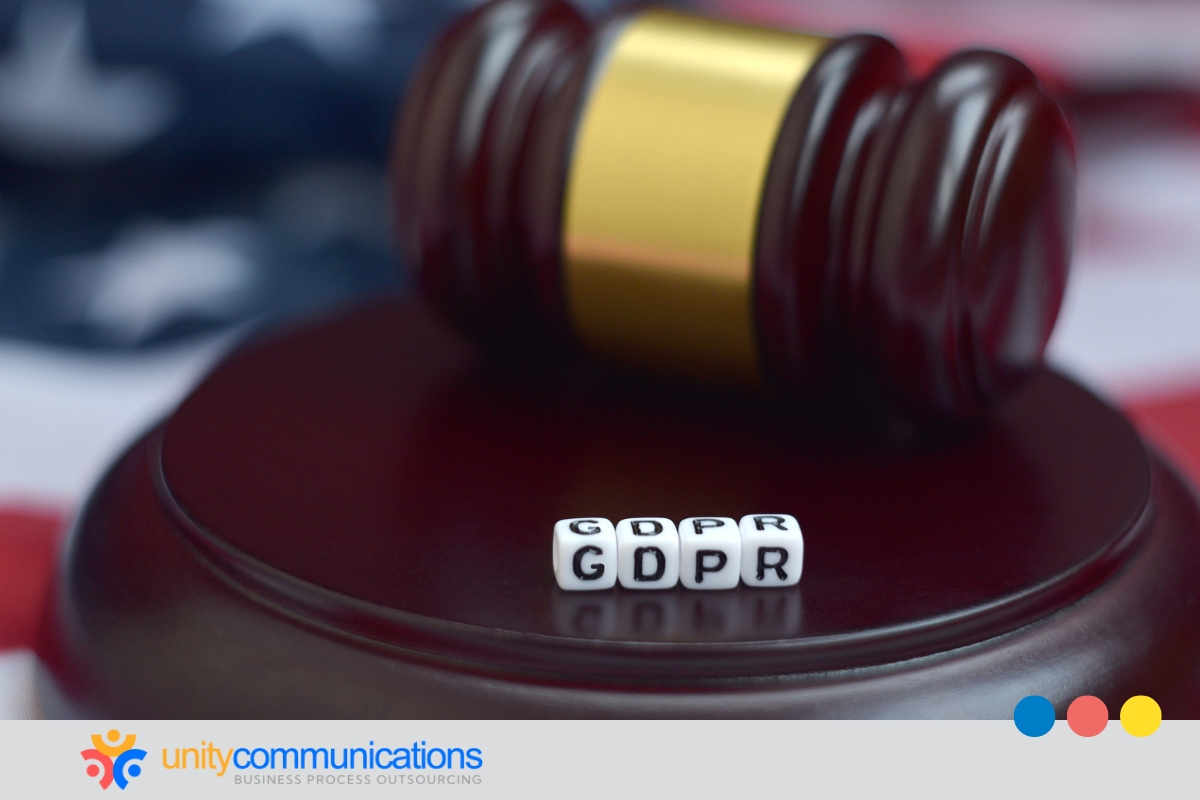Table of Contents
Outsourcing email marketing is an effective way to drive results while saving time and resources. Third-party vendors offer the expertise and tools to develop content, implement campaigns, manage lists, and implement follow-ups.
However, businesses must remain compliant in outsourced email operations. Global regulations protect consumers’ privacy and reduce spam. As such, businesses leveraging business process outsourcing (BPO) for email marketing must ensure their campaigns consistently meet standards.
This article explores the ins and outs of legal compliance in outsourced emails. Keep reading to learn how to run compliant initiatives!
What does legal compliance in email marketing mean?

Legal compliance in email marketing involves following laws and regulations dictating how businesses communicate with consumers via email. These standards primarily aim to prevent spam and safeguard user data.
The importance of compliance goes beyond avoiding fines. It directly affects your brand’s reputation and customer trust. With spam messages accounting for over 46.8% of all email traffic in December 2023, adhering to email marketing laws ensures your campaigns are legitimate and trustworthy.
Understanding key email marketing laws
Several regulations shape email marketing globally, and businesses must stay informed to avoid pitfalls:
- The Controlling the Assault of Non-Solicited Pornography And Marketing (CAN-SPAM) Act of 2003 sets rules for commercial emails, including providing accurate sender information, no misleading subject lines, and clear opt-out options.
- The General Data Protection Regulation (GDPR) focuses on data protection and requires explicit consent before sending marketing emails.
- Canada’s Anti-Spam Legislation (CASL) requires businesses to obtain prior consent and include clear identification and unsubscribe mechanisms.
Each regulation applies differently depending on your audience’s location, so understanding their nuances is critical.
Responsibilities when outsourcing email marketing
Outsourcing is a strategic way to streamline campaigns and drive better results. Understanding what BPO is—a model where businesses delegate specific tasks or processes to external providers—can help better manage responsibilities and expectations.
In a BPO partnership, the business must provide accurate data, establish clear campaign goals, and set compliance benchmarks. Meanwhile, the vendor must execute campaigns per legal standards, including securing data and honoring opt-in and opt-out requirements.
Below are the following responsibilities for each party:
| Responsibility | Business Responsibilities | Third-Party Vendor Responsibilities |
|---|---|---|
| Provide accurate data | Collect and provide accurate, legally obtained customer data. | Use provided data responsibly so it complies with regulations such as GDPR, CAN-SPAM, and CASL. |
| Set campaign goals | Define objectives, including target audiences, desired outcomes, and key performance indicators (KPIs). | Execute campaigns to align with the business’s defined goals and optimize performance based on KPIs. |
| Establish compliance benchmarks | Include detailed compliance requirements in service-level agreements (SLAs), such as adherence to opt-in laws and sender information rules. | Guarantee all campaigns meet the compliance benchmarks set by the business, adhering strictly to regulations governing email marketing. |
| Maintain oversight | Regularly monitor campaign activities, audit email lists, and review opt-in and opt-out records to confirm compliance. | Transparently share campaign data, opt-in records, and performance metrics to help the business maintain oversight and meet compliance needs. |
| Secure data | Provide only authorized and properly collected customer data and include data handling requirements in agreements. | Implement robust security measures such as encryption, secure storage, limited data access, and regular compliance checks. |
| Handle opt-outs | Set up processes to support opt-outs and regularly review compliance with unsubscribe requests. | Process unsubscribe requests promptly and provide opt-out logs. |
Businesses and vendors can run effective and trust-building email marketing campaigns by fostering collaboration, maintaining oversight, and prioritizing legal compliance in outsourced emails.
Why legal compliance matters in outsourced email marketing

Ignoring email marketing regulations can threaten the bottom line. Penalties for non-compliance can be severe. For instance, GDPR violations can lead to fines of up to €20 million or 4% of your annual global turnover, whichever is higher.
Beyond financial penalties, non-compliance can damage consumer trust, a cornerstone of long-term success. Customers expect transparency and respect in how businesses handle and communicate with their data. Ignoring these expectations alienates your audience and undermines your brand’s credibility.
Following email marketing laws signals your commitment to ethical practices and respect for consumer rights. It fosters trust and loyalty, translating into stronger, lasting customer relationships.
Compliance is your responsibility when you outsource email marketing to a BPO vendor. Outsourcing doesn’t shift legal accountability. Businesses must actively oversee and collaborate with their vendors so every campaign aligns with the law.
By taking the time to understand and implement legal compliance in outsourced emails, your business avoids risks and creates a strong foundation for ethical and effective email marketing that resonates with your audience.
Data protection and privacy considerations
Data protection and privacy considerations are critical to email marketing, especially when outsourcing to third-party vendors. Businesses and their BPO partners must work together to handle data securely and comply with applicable laws.
Privacy considerations in outsourced email campaigns
Privacy regulations require businesses to respect the rights of email recipients, including how to store, use, and collect data. For example:
- Obtaining consent. GDPR mandates explicit user opt-in consent before sending marketing emails. Businesses must ensure that vendors adhere to this principle by using compliant sign-up forms and retaining proof of consent.
- Honoring opt-out requests. CAN-SPAM requires that businesses honor opt-out requests promptly. Vendors must process these requests efficiently to avoid penalties.
- Minimizing data. Privacy laws advocate collecting only the data necessary for specific purposes. Businesses should determine whether vendors follow this practice and avoid using unnecessary or sensitive information.
Best practices for data protection and privacy
To safeguard customer information and maintain compliance, businesses and vendors should adopt the following best practices:
- Conduct due diligence. Verify their data protection policies and security infrastructure before partnering with a vendor. Ask for certifications such as ISO 27001, demonstrating a data security commitment.
- Use secure communication channels. Encrypt data transfers to protect them against breaches.
- Draft clear contracts. Include data protection clauses in agreements that specify handling, storing, and accessing data.
- Perform regular audits. Periodically review compliance with data protection regulations to address gaps.
Best practices for maintaining compliance in outsourced email campaigns

Maintaining legal compliance in outsourced emails is critical to avoiding legal risks and preserving customer trust. Businesses and BPO organizations must adopt these best practices to manage compliant campaigns:
1. Choose experienced BPO organizations
Work with BPO partners with a proven track record in managing compliant email marketing campaigns. Look for providers knowledgeable about global regulations and who demonstrate a commitment to ethical practices.
When selecting a vendor, verify their credentials, request case studies or references, and assess their familiarity with industry-specific compliance requirements. An experienced partner can minimize risks while executing campaigns effectively.
2. Establish clear contracts and SLAs
Define compliance requirements in detailed contracts or SLAs. Include clauses that address:
- Adherence to email regulations (e.g., opt-in policies, sender information, and opt-out mechanisms)
- Data protection standards, such as encryption, secure storage, and access controls
- Penalties for non-compliance or breaches
Clear agreements help both parties understand their responsibilities and provide a foundation for accountability. This is especially important given the risks involved in vendor relationships. For example, a 2024 study found that 61% of companies experienced a third-party data breach or security incident due to insufficient vendor oversight.
3. Ensure transparent reporting
Require your BPO organization to provide regular reports on campaign performance and compliance. These reports should include the following:
- Opt-in and opt-out records
- Email delivery metrics (e.g., open rates, bounce rates, and spam complaints)
- Documentation of compliance with laws, such as GDPR or CAN-SPAM
Transparency allows businesses to monitor their campaigns effectively and address issues proactively.
The bottom line
Outsourcing email marketing to BPO organizations offers efficiency, expertise, and the ability to scale your campaigns quickly. However, it also comes with shared responsibilities. Legal compliance in outsourced emails is essential to protecting your business from penalties, maintaining customer trust, and delivering effective marketing campaigns.
Building a strong partnership with a reliable BPO provider aligns your email marketing efforts with legal standards and customer expectations. Ready to optimize your email campaigns with expert outsourcing solutions? Let’s connect!



